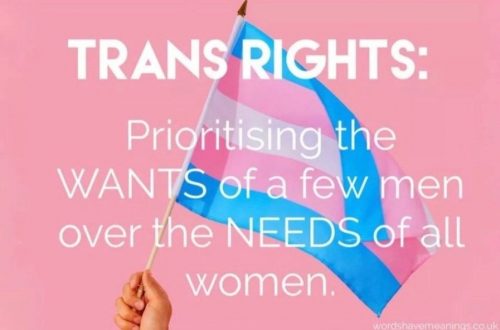Wednesday 9pm I was watching a favourite undemanding telly program, Law & Order: UK, and was startled when the usual murder-and-trial plot dealt with female genital mutilation (FGM). The programme is still available on catch up. It includes a strong speech from a woman about the horrors of FGM, both the operation itself and the effects it has on the body and mental state for the rest of the victim’s life. I have to say that I found this speech hard to listen to, as the thought of FGM makes me feel very sick. The woman was denounced as a westernised whore by her hijabbed sister-in-law, so evidently no fears of accusations of islamophobia had constrained the script writers.
I don’t think FGM has ever been handled by prime time television before in the way that domestic violence has been in East Enders or marital rape in Criminal Justice. Both domestic violence and marital rape were once thought of as family affairs that sufferers were reluctant to bring out into the open and which the police were leery about getting involved in. Then, after campaigning they came into view as subjects of discussion, as themes in controversial drama then run-of-the-mill drama along with changes of attitude from the public and with more action against the offenders and sympathy towards the victims from the police.
As everyone knows, the UK’s record on prosecutions of FGM is appalling. The law against it was passed thirty years ago and the first case will appear in court on April 15.
According to Sarah Ditum in the New Statesman there are various reasons for the lack of prosecutions – family loyalty; matters of jurisdiction (the victim is often foreign and has been cut in a foreign country); and physical symptoms i.e. it is difficult to date when the mutilation took place and so it may not be liable for prosecution under current legislation. There is also the matter of the status of women within the communities where FGM is practised.
“Male violence against women,” says Ali [Nimko Ali, co-founder and CEO of the organisation Daughters of Eve]. “That’s ultimately what FGM is. This is about controlling women’s bodies and controlling how they see themselves in society. A lot of the people that are practising FGM right now are well educated but the women haven’t been emancipated from those cultures and the men ultimately believe in those control frameworks.” There’s an ongoing failure to educate girls about their rights but, Ali stresses, no defence of naivety can be extended to the perpetrators and promoters of this crime: “None of these people are ignorant. Those that are pro-FGM often know more about the law than the people that should looking after the girls that are at risk.”
But for a long time, authority figures who endorsed or tolerated FGM within their own communities were treated as the official spokespeople on the issue – and that left girls voiceless. “It’s [politicians] being in bed with community leaders, the male community leaders, that has meant that women won’t come forward,” says Ali. “Because the women know that those they seek to trust are talking to the ones that are seeking to abuse them.” This is the context in which FGM has been allowed to go on unopposed until very recently: one where within certain African immigrant communities black men dominated black women’s lives, and the largely white (and largely, though not exclusively, male) mainstream condoned that domination.
Nimko Ali has appeared in popular women’s magazines like Grazia and Stylist and FGM as a campaigning issue has been taken up by the Guardian with resultant action from the education secretary Michael Gove.
The education secretary, Michael Gove, has written to every school in England warning them to be alert to the dangers of female genital mutilation (FGM) after a Guardian campaign to bring the issue into schools attracted the support of more than 230,000 people.
…….
After meeting 17-year-old Brighton schoolgirl Fahma Mohamed, who led the campaign, Gove has sent a letter to all headteachers in England alerting them to new guidelines designed to keep children safe, which includes guidance on FGM. A spokeswoman for the Department for Education told the Guardian that the education secretary would keep up pressure on schools by flagging up the dangers of FGM again in his annual “back to school” letter in September.
Rape and domestic violence will be forever with us, however glaringly their hatefulness is shown in fictional form on prime time telly. FGM though, a form of child abuse as well as a tool for female control, is a very specific practice and could be ended like, say, foot-binding, or the scold’s bridle (to mention a Scottish practice and avoid accusations of racial and cultural superiority and imperialism). It’s been allowed to carry on for a generation, which is a scandal, and the specifics of this neglect, and why those with suspicions or actual information did not act, have not yet been clearly stated.
A watershed moment for us was when the NSPCC got on board and started talking about it in terms of child abuse. Since I started campaigning against FGM, I’ve noticed time and time again how we have the information and we also have the structures to deal with abuse here in the UK, but in the case of FGM, these just don’t come together. Frontline staff who deal with children, like teachers and social workers, have an abundance of this information – they just don’t pass it on. At an All-Party Parliamentary Group meeting two weeks ago, a doctor told me that she sees girls in her clinic who have undergone FGM all the time. I said, ‘Why haven’t you told the police?’ and she replied, ‘Well, I’d want to be anonymous.’ That was so disconcerting. She would never have said that about rape victims; she knows in the case of rape that it’s a clear-cut crime where information has to be passed on. A Metropolitan police officer told me that they have all the resources in place to deal with FGM cases, but no frontline staff are passing on the information they have. Openly recognising FGM as child abuse should change all that.


